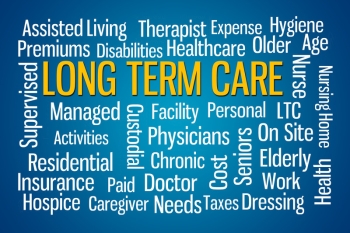Long-term care involves a variety of
services designed to meet a person's health or personal care needs
during a short or long period of time. These services help people
live as independently and safely as possible when they can no
longer perform everyday activities on their own.
The most common type of long-term care is personal care-help with everyday activities, also called "activities of daily living." These activities include bathing, dressing, grooming, using the toilet, eating, and moving around-for example, getting out of bed and into a chair.
Long-term care also includes community services such as meals, adult day care, and transportation services. These services may be provided free or for a fee.
Homemaker and Personal Care Services
Medicare DOES NOT cover.
Home health agencies and non medical in-home care agencies offer homemaker and personal care services that can be purchased without a physician's order. Homemaker services can include help with meal preparation and household chores. Personal care includes help with bathing and dressing. Agencies do not have to be approved by Medicare to provide these kinds of services.
Home
Health Care
Medicare DOES cover.
People often need long-term care when they have a serious, ongoing health condition or disability. The need for long-term care can arise suddenly, such as after a heart attack or stroke. Most often, however, it develops gradually, as people get older and frailer or as an illness or disability gets worse.
Home Health Care involves part-time medical services ordered by a physician for a specific condition. These services may include nursing care to help a person recover from surgery, an accident, or illness. Home health care may also include physical, occupational, or speech therapy and temporary home health aide services. These services are provided by home health care agencies approved by Medicare, a government insurance program for people over age 65.
Senior Transportation Services
Transportation services help people get to and from medical appointments, shopping centers, and other places in the community. Some senior housing complexes and community groups offer transportation services. Many public transit agencies have services for people with disabilities. Some services are free. Others charge a fee.
Emergency Medical Alert Systems
Emergency response systems automatically respond to medical and other emergencies via electronic monitors. The user wears a necklace or bracelet with a button to push in an emergency. Pushing the button summons emergency help to the home. This type of service is especially useful for people who live alone or are at risk of falling. A monthly fee is charged.
Related Articles:
- Homemaker / Non Medical In-Home Care
- How to Know When It's Time for Hospice
- Texas Medical Alert Devices
- Types of Home Health Services
- Texas Senior Care Facilities
Elder Options of Texas
Copyright 2001-2024
All Rights Reserved
DISCLAIMER: Links to other websites or references to products, services or publications do not imply the endorsement or approval of such websites, products, services or publications by Elder Options of Texas. The determination of the need for senior care services and the choice of a facility is an extremely important decision. Please make your own independent investigation.


